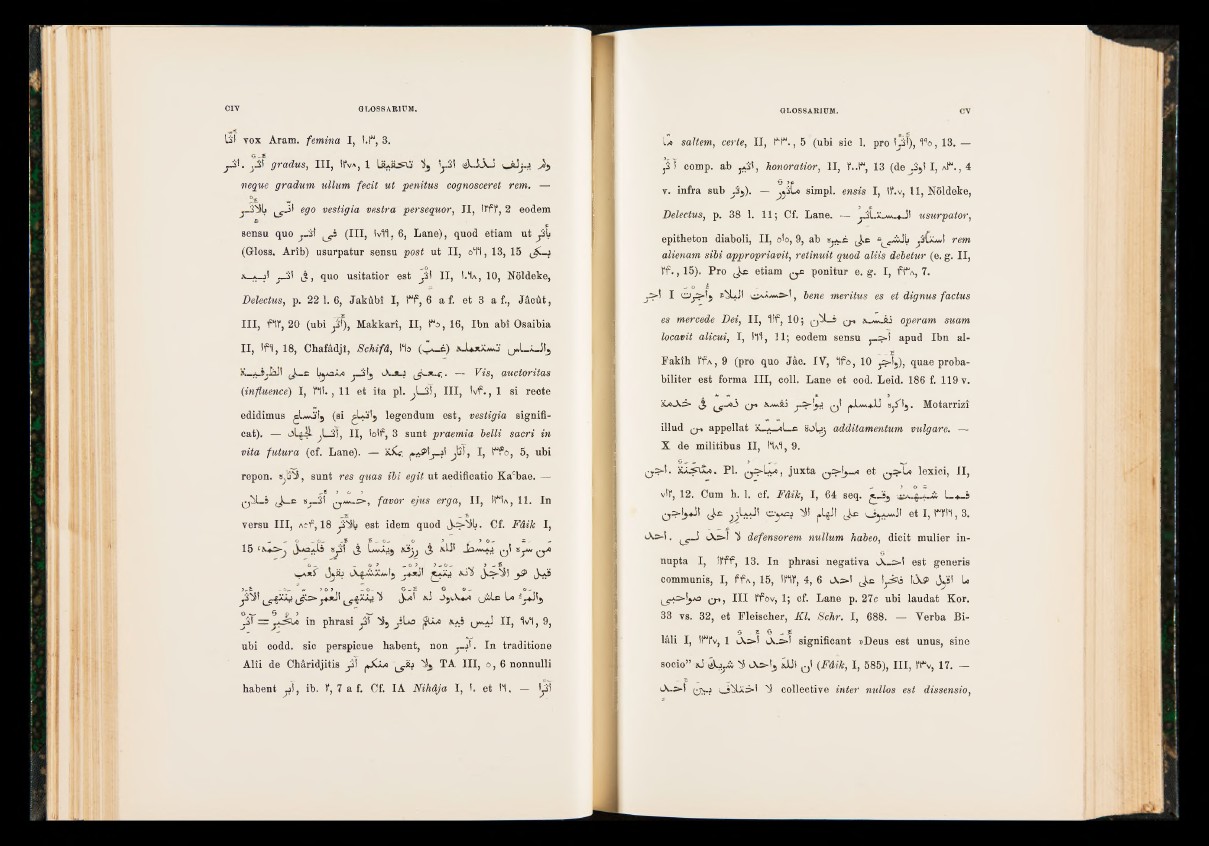
CIV GLOSSARIUM.
li( vox Aram, femina I, Lt", 3.
^ t . gradus^ I I I , ît*vA, 1 y i t i^kJuXJ
neque gradum ullum fecit ut penitus cognosceret rem, —
^ J t ego vestigia vestra persequor,^ I I , tfft*, 2 eodem
£ ^
sensu quo y t y ( I I I , IvlLG, L an e ), quod etiam u t yL
(Gloss. Arib) usu rp a tu r sensu post u t I I , o il, 13, 15 f - i
E Ù
\_ 0 j i y I 3 , quo u sita tio r est y l I I , 1.1a, 10, Nöldeke,
Delectus, p. 22 1.6, J a k û b î I , t“f , 6 a f. e t 3 a f., J â c û t,
I I I , f i f , 20 (ubi y'f), Makkarî, I I , l“o, 16, Ib n abi Osaibia
I I , Ifl, 18, Cbafâdjî, Schifâ, Ho (M -é ) (jaLà_J1j
(Jk-E Lj*aÀ*i y t j 0 -*-e. . — Vis, auctoritas
(influence) I, fi l . , 11 et ita pl. jL_ôT, I I I , Ivf., 1 si recte
edidimus ^Leô'Ij (si legen dum e st, vestigia significat).
— ^1—21, I I , lûlf, 3 su n t praemia belli sacri in
vita futura (cf. Lane). — Ktw. jA ^ l y l I, t“fo , 5, ubi
repon. , su n t res quas ibi egit ut aedificatio K a 'b a e . —
A 3 O 3
q IL -î (3 -e » y i 0 AV..E», favor ejus erga, I I , Iî^Ia, 11. In
versu I I I , Aof, 18 y t i est idem quod Cf. Fâik I,
_-OeOe eÎ^SeOe o , 3 eJOe 5 e
15 »y! 3 LwÂJj « y , 3 q I s y 0 j)
Û E E o 3 e ù 3 3 e O e 3 e E
Jl JJXJ y L l y y - ï
Je^ e CIe w JÛ> eOe Ge2 g Oe Ûe
^ ' i L y y o y s - y j t J l y  À j l y l «.J y L s Lo y t ^ ,
G -E- O o 3
y t — in phrasi y l % I I , iv l, 9,
ubi codd. sic perspicue b ab en t, non y ' . In trad itio n e
Alii de Cbâridjitis y ï fX A y â i X, TA I I I , o, 6 nonnulli
bab en t y ï , ib. f, 7 a f. Cf. lA Nihâja I, t. e t 11. - f
0L088ARIDM.
I/O saltern, certe, I I , fit“ . , 5 (ubi sic 1, pro ly l), l^o, 13. —
jjT comp, ab y l , honoratior, I I , f..t“, 13 (de .2jt I, aI“ . , 4
G 3C
V . infra sub y ) . — y iL o simpl. ensis I, tf.v, 11, Nöldeke,
Delectus, p. 38 1. 11; Cf. Lane. — yL.X_w,.yt usurpator,
epitheton diaboli, II , oto, 9, ab » yÉ y y j j J L yUw.1 rem
alienam sibi appropriavit, retinuit quod aliis debetur (e. g. I I ,
f f . , 15). P ro y etiam ^ e po n itu r e. g. I, ffiA, 7.
_ o i
I o y > ! j slUJI , bene meritus es et dignus factus
es mercede Dei, I I , Ilf, 10; 04 js..wA..aj operam suam
locavit alicui. I, h i , 11; eodem sensu j_e-I apud Ib n al-
F a k ih ffA, 9 (pro quo Ja c . IV, Ifo , 10 j5*lj), quae probab
ilite r est forma I I I , coll. Lane e t cod. Leid. 186 f. 119 v.
ÄjoAi- 3 0 -'’^ c r KAv.aj q I jIje+ IJ »A'i- Motarrizi
illud 04 appellat X-^—oLe B j y additamenUm vulgare. —
X de militibus I I , I IaI , 9.
0 =*!. üI.;^A/o. PI. 0 0 - y , ju x ta 0 0 >y.« e t 0 =>L< lexiei, I I ,
vlf, 12. Cum b. 1. cf. Fâik, I, 64 seq. y s j ,Ë L+_5
0 > y j i y y i y i o y « l i y j i y y y t e t i, t“f i i , 3.
. ^ _ J A=»l 1 defensorem nullum habeo, d ic it mulier inn
upta I, Ifff, 13. In phrasi n eg a tiv a A _ > l est generis
communis. I, f fo, 15, Iflf, 4, 6 A > l y t y \ i lAS> J y l Lo
0 0 o > y 0 4 , I I I ffov, 1; cf. Lane p. 27c ubi lau d a t Kor.
33 vs. 32, e t Fle isch e r, Kl. Sehr. I, 688. — Verba Bi-
G . Ï O . S
bill I, Ififv, 1 Ae»I A.5>! significant »Deus est unus, sine
socio” *J y y L lUt 0 l (Fdik, I, 585), I I I , ffiv, 17. —
5 E
»A.E-I (0,0 gJIUÉ"! L collective inter nullos est dissensio.